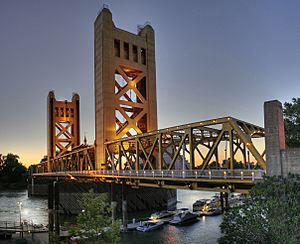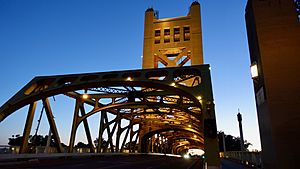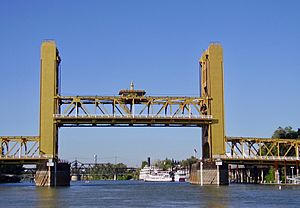Tower Bridge (Sacramento, California) facts for kids
Quick facts for kids Tower Bridge |
|
|---|---|

The Tower Bridge just after sunset
|
|
| Coordinates | 38°34′50″N 121°30′30″W / 38.580556°N 121.508333°W |
| Carries | Cars, bicycles, pedestrians, and previously railroad on 4 vehicle lanes and 2 bicycle lanes of |
| Crosses | Sacramento River |
| Locale | West Sacramento and Sacramento, California |
| Maintained by | Caltrans |
| NBI | 22 0021 |
| Characteristics | |
| Design | Vertical lift bridge |
| Total length | 737 ft (225 m) |
| Width | 52 ft (16 m) |
| Height | 160 ft (49 m) |
| Longest span | 209 ft (64 m) lift span |
| Number of spans | 8 |
| Piers in water | 2 |
| Clearance below | 100 ft (30 m) above high water |
| History | |
| Architect | Alfred Eichler |
| Constructed by | George Pollock & Company |
| Construction cost | US$994,000 (equivalent to $21,220,000 in 2022) |
| Opened | December 15, 1935 |
| Replaces | 1910 Sacramento Northern Railway swing through-truss bridge |
|
Tower Bridge
|
|
| Architect | Alfred Eichler |
| Architectural style | Span Drive Type |
| NRHP reference No. | 82004845 |
| Designated | 1982 |
The Tower Bridge is a special kind of bridge called a vertical lift bridge. It crosses the Sacramento River in California. This bridge connects West Sacramento (in Yolo County) on the west side with Sacramento (the capital of California, in Sacramento County) on the east side.
It was once known as the M Street Bridge. The Tower Bridge used to be part of a major highway called U.S. Route 40. Today, the California Department of Transportation takes care of the bridge. It is part of State Route 275. The bridge links West Capitol Avenue in West Sacramento with the Capitol Mall in Sacramento.
In 1982, the Tower Bridge was added to the National Register of Historic Places. This means it is an important historical site.
Contents
History of the Tower Bridge
Building a New Bridge
The Tower Bridge replaced an older bridge from 1911, also called the M Street Bridge. That old bridge was first built for trains. Later, sections were added to its sides for cars.
Between 1910 and 1935, Sacramento's population grew a lot. The old bridge became too small for all the traffic. By 1933, city leaders realized they needed a better way to cross the Sacramento River.
On December 22, 1933, the State of California, Sacramento County, and the Sacramento Northern Railway met to plan a new bridge. They agreed on March 8, 1934. Construction began on July 20, 1934. While the new bridge was being built, cars used the I Street Bridge. Trains used a temporary bridge nearby.
How the Bridge Was Designed
The Tower Bridge was designed to be 52 ft (16 m) wide. It had sidewalks for people to walk on. It also had two lanes for cars and a wider 13-foot (4.0 m) center lane for trains. The tall towers of the bridge are 160 ft (49 m) high.
The bridge has several parts. It has a short girder span, an eastern truss approach span, and the main lift span in the middle. It also has a western approach span and four more girder spans. When the middle part of the bridge is lifted, there is 100 feet (30 m) of space below it for boats to pass.
The lift span itself is very heavy, weighing 1,150 short tons (1,040 t). But it uses counterweights inside each tower. These weights balance the span, so it only needs two small electric motors to lift it.
The bridge's design is called Streamline Moderne. This style was popular when the bridge was built. The towers are covered in steel to make them look smooth and modern. In 1935, the American Institute of Steel Construction gave the Tower Bridge an award.
On December 15, 1935, California's governor, Frank Merriam, officially opened the bridge. He led the first parade across it. To share the news, 1000 homing pigeons were released! The first train had already crossed the bridge on November 7, 1935. The Tower Bridge was the first vertical lift bridge in California's state highway system.
The train tracks were removed from the bridge in 1963. After that, the bridge was restriped to have four lanes for cars. There is a special crossing on the east side of the bridge. It helps stop cars when the bridge is about to lift. When a warning siren sounds, the crossing blocks traffic until the bridge is safe again.
Changing the Bridge's Color
For many years, the bridge was painted silver. But people complained that the silver paint caused too much glare. The concrete parts of the bridge were first painted a sky-blue color.
In June 1976, for the Bicentennial celebration, the bridge was painted yellow-ochre. This color was chosen to match the gold dome of the nearby State Capitol building.
By 2001, the yellow paint was fading. Residents living near the capital voted on a new color. They could choose all-gold, green-gold-silver, or burgundy-silver-gold. The winning choice was all gold, and the bridge was repainted in 2002.
However, the new gold color also caused some discussion. Some people felt it wasn't as shiny as they expected. Others thought a copper color might have looked better with nearby buildings. The new paint job is expected to last for 30 years.
Future Plans for Rail Traffic
Since 1963, the Tower Bridge has only been used by people walking, biking, and cars. In 2007, transportation groups started thinking about adding trolley service across the bridge. By 2020, these plans had changed. Now, there are ideas to extend the RT Light Rail system to use the bridge. This would bring light rail service to West Sacramento.
Images for kids
 | William L. Dawson |
 | W. E. B. Du Bois |
 | Harry Belafonte |




